【弯道超车】Unit 2 We're Family! 核心考点(单词 短语 句型 语法)-2025年鲁教版(五四学制)(2024)新六年级英语上册精讲精练 (含答案解析)
文档属性
| 名称 | 【弯道超车】Unit 2 We're Family! 核心考点(单词 短语 句型 语法)-2025年鲁教版(五四学制)(2024)新六年级英语上册精讲精练 (含答案解析) | 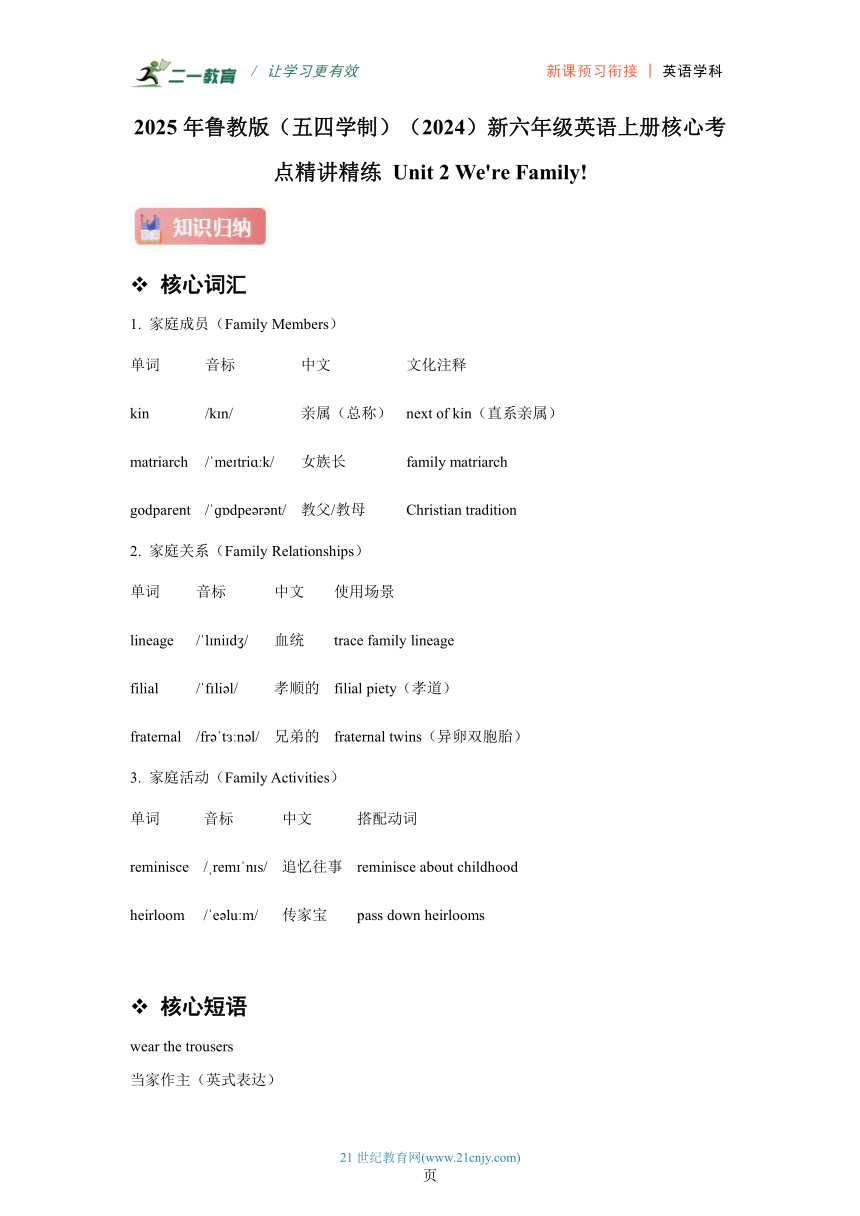 | |
| 格式 | docx | ||
| 文件大小 | 64.8KB | ||
| 资源类型 | 试卷 | ||
| 版本资源 | 鲁教版 | ||
| 科目 | 英语 | ||
| 更新时间 | 2025-07-08 15:41:01 | ||
图片预览

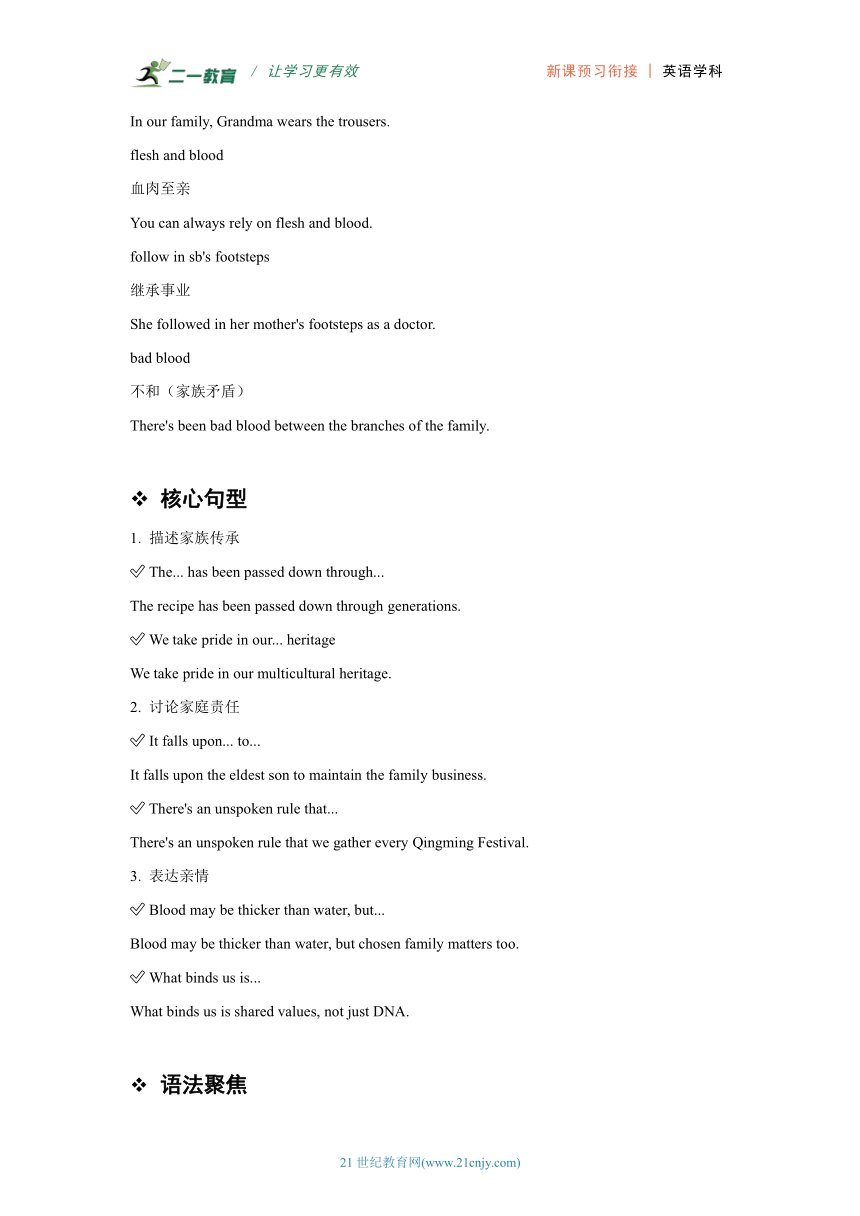
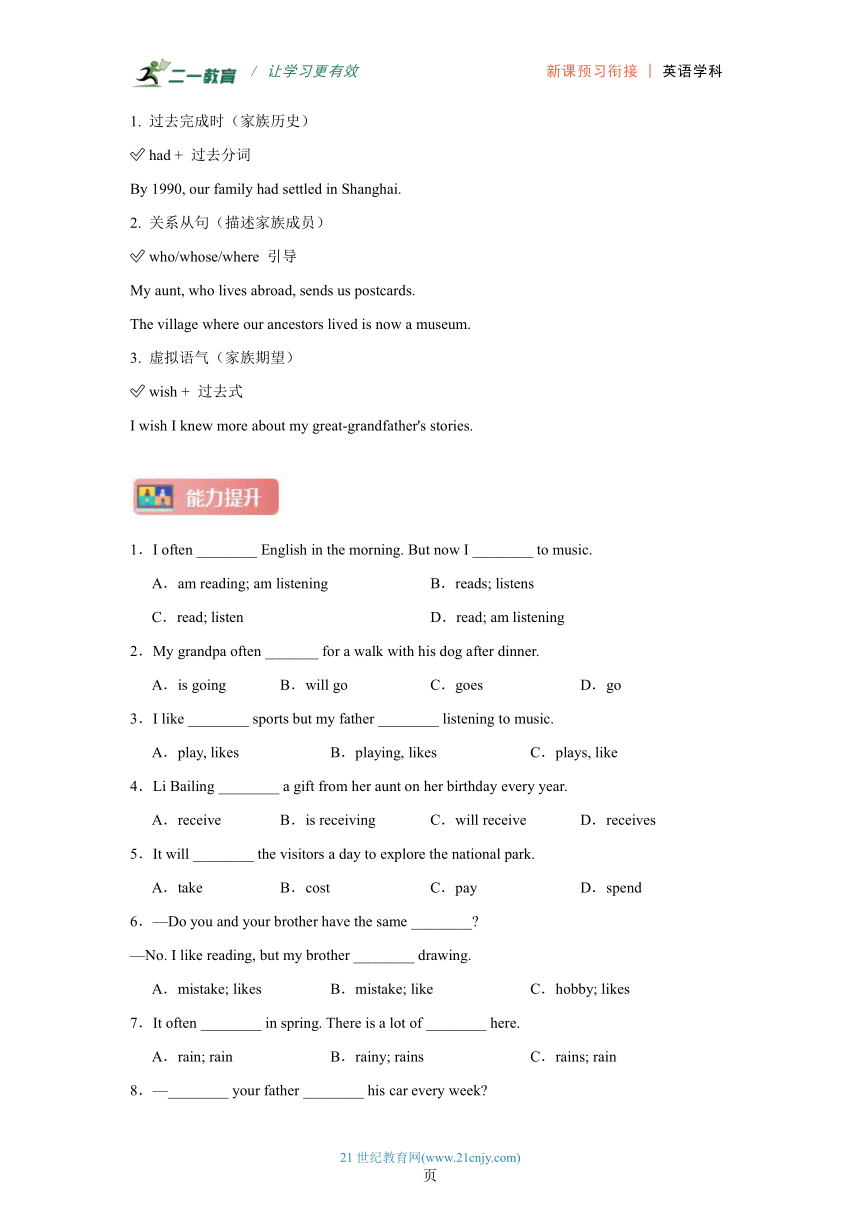
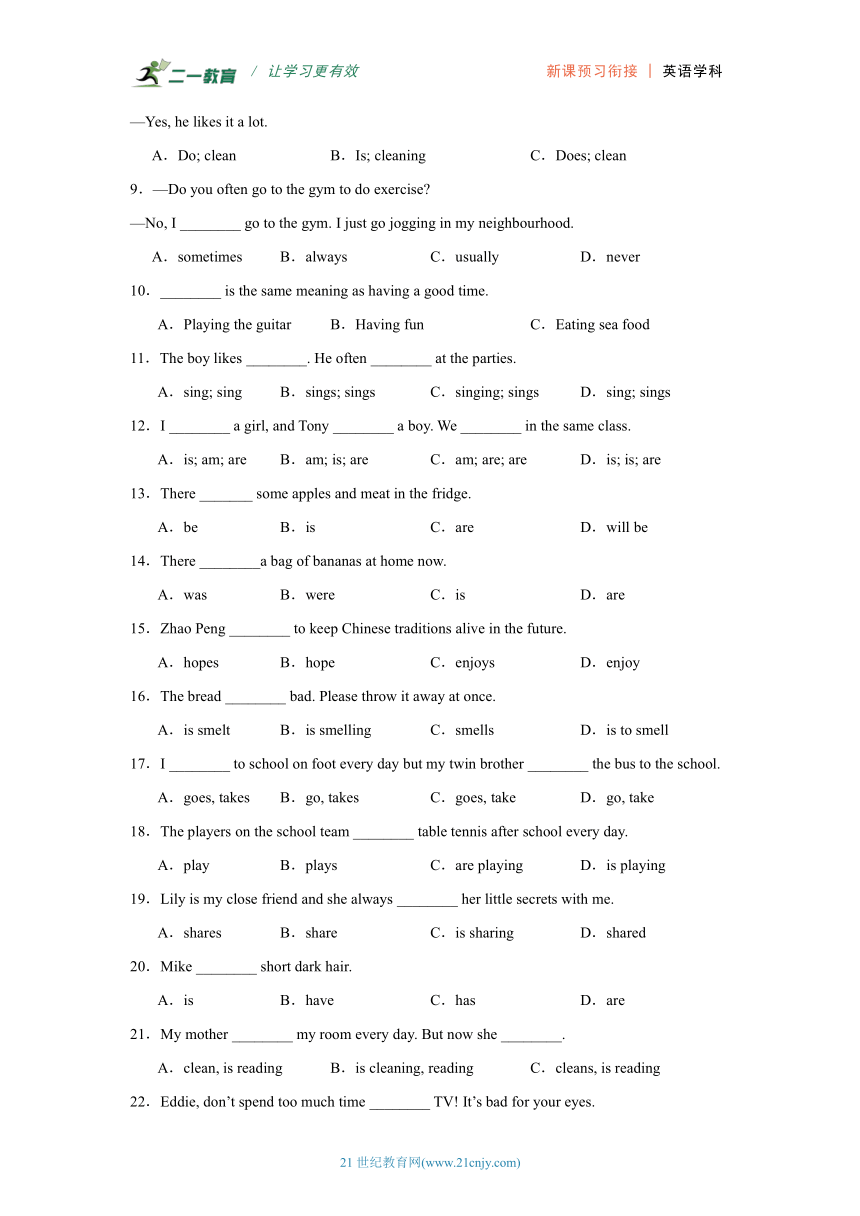
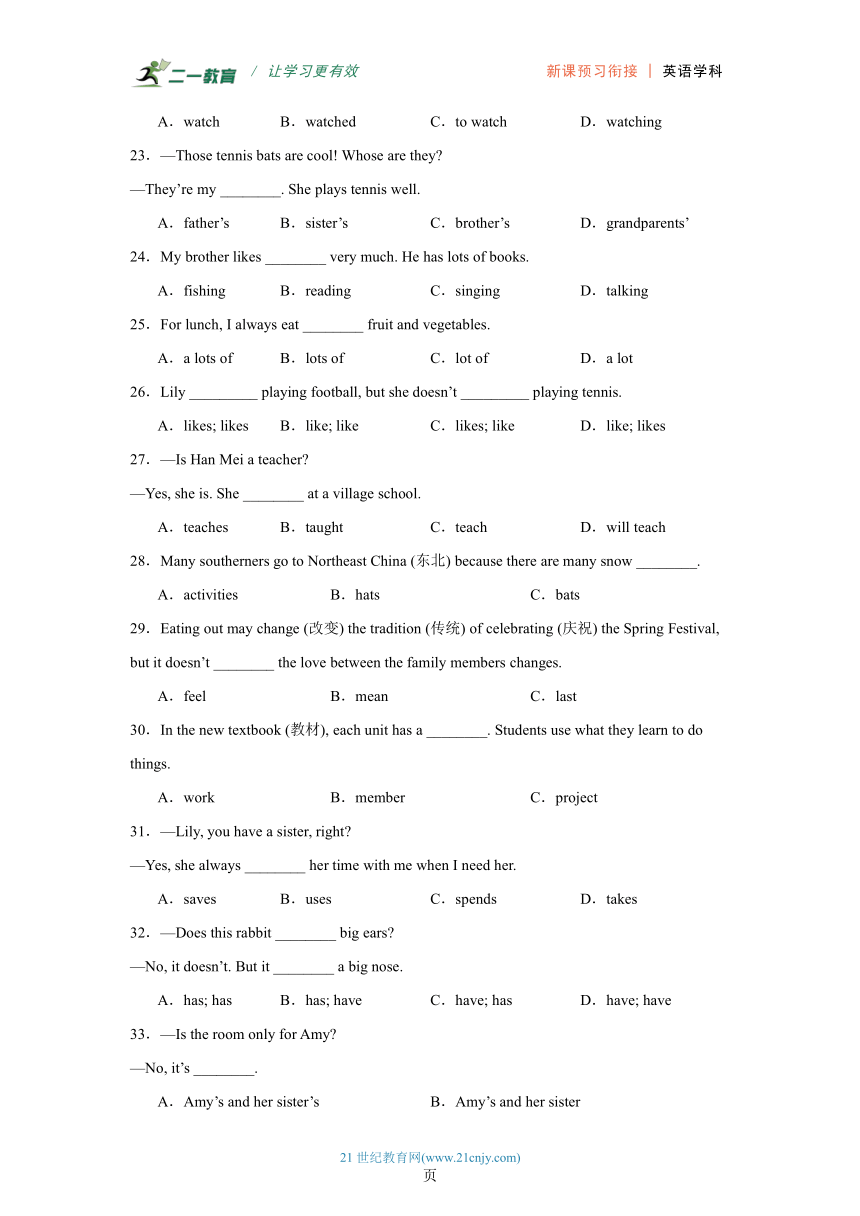
文档简介
/ 让学习更有效 新课预习衔接 | 英语学科
/ 让学习更有效 新课预习衔接 | 英语学科
2025年鲁教版(五四学制)(2024)新六年级英语上册核心考点精讲精练 Unit 2 We're Family!
核心词汇
1. 家庭成员(Family Members)
单词 音标 中文 文化注释
kin /k n/ 亲属(总称) next of kin(直系亲属)
matriarch / me triɑ k/ 女族长 family matriarch
godparent / ɡ dpe r nt/ 教父/教母 Christian tradition
2. 家庭关系(Family Relationships)
单词 音标 中文 使用场景
lineage / l ni d / 血统 trace family lineage
filial / f li l/ 孝顺的 filial piety(孝道)
fraternal /fr t n l/ 兄弟的 fraternal twins(异卵双胞胎)
3. 家庭活动(Family Activities)
单词 音标 中文 搭配动词
reminisce / rem n s/ 追忆往事 reminisce about childhood
heirloom / e lu m/ 传家宝 pass down heirlooms
核心短语
wear the trousers
当家作主(英式表达)
In our family, Grandma wears the trousers.
flesh and blood
血肉至亲
You can always rely on flesh and blood.
follow in sb's footsteps
继承事业
She followed in her mother's footsteps as a doctor.
bad blood
不和(家族矛盾)
There's been bad blood between the branches of the family.
核心句型
1. 描述家族传承
The... has been passed down through...
The recipe has been passed down through generations.
We take pride in our... heritage
We take pride in our multicultural heritage.
2. 讨论家庭责任
It falls upon... to...
It falls upon the eldest son to maintain the family business.
There's an unspoken rule that...
There's an unspoken rule that we gather every Qingming Festival.
3. 表达亲情
Blood may be thicker than water, but...
Blood may be thicker than water, but chosen family matters too.
What binds us is...
What binds us is shared values, not just DNA.
语法聚焦
1. 过去完成时(家族历史)
had + 过去分词
By 1990, our family had settled in Shanghai.
2. 关系从句(描述家族成员)
who/whose/where 引导
My aunt, who lives abroad, sends us postcards.
The village where our ancestors lived is now a museum.
3. 虚拟语气(家族期望)
wish + 过去式
I wish I knew more about my great-grandfather's stories.
1.I often ________ English in the morning. But now I ________ to music.
A.am reading; am listening B.reads; listens
C.read; listen D.read; am listening
2.My grandpa often _______ for a walk with his dog after dinner.
A.is going B.will go C.goes D.go
3.I like ________ sports but my father ________ listening to music.
A.play, likes B.playing, likes C.plays, like
4.Li Bailing ________ a gift from her aunt on her birthday every year.
A.receive B.is receiving C.will receive D.receives
5.It will ________ the visitors a day to explore the national park.
A.take B.cost C.pay D.spend
6.—Do you and your brother have the same ________
—No. I like reading, but my brother ________ drawing.
A.mistake; likes B.mistake; like C.hobby; likes
7.It often ________ in spring. There is a lot of ________ here.
A.rain; rain B.rainy; rains C.rains; rain
8.—________ your father ________ his car every week
—Yes, he likes it a lot.
A.Do; clean B.Is; cleaning C.Does; clean
9.—Do you often go to the gym to do exercise
—No, I ________ go to the gym. I just go jogging in my neighbourhood.
A.sometimes B.always C.usually D.never
10.________ is the same meaning as having a good time.
A.Playing the guitar B.Having fun C.Eating sea food
11.The boy likes ________. He often ________ at the parties.
A.sing; sing B.sings; sings C.singing; sings D.sing; sings
12.I ________ a girl, and Tony ________ a boy. We ________ in the same class.
A.is; am; are B.am; is; are C.am; are; are D.is; is; are
13.There _______ some apples and meat in the fridge.
A.be B.is C.are D.will be
14.There ________a bag of bananas at home now.
A.was B.were C.is D.are
15.Zhao Peng ________ to keep Chinese traditions alive in the future.
A.hopes B.hope C.enjoys D.enjoy
16.The bread ________ bad. Please throw it away at once.
A.is smelt B.is smelling C.smells D.is to smell
17.I ________ to school on foot every day but my twin brother ________ the bus to the school.
A.goes, takes B.go, takes C.goes, take D.go, take
18.The players on the school team ________ table tennis after school every day.
A.play B.plays C.are playing D.is playing
19.Lily is my close friend and she always ________ her little secrets with me.
A.shares B.share C.is sharing D.shared
20.Mike ________ short dark hair.
A.is B.have C.has D.are
21.My mother ________ my room every day. But now she ________.
A.clean, is reading B.is cleaning, reading C.cleans, is reading
22.Eddie, don’t spend too much time ________ TV! It’s bad for your eyes.
A.watch B.watched C.to watch D.watching
23.—Those tennis bats are cool! Whose are they
—They’re my ________. She plays tennis well.
A.father’s B.sister’s C.brother’s D.grandparents’
24.My brother likes ________ very much. He has lots of books.
A.fishing B.reading C.singing D.talking
25.For lunch, I always eat ________ fruit and vegetables.
A.a lots of B.lots of C.lot of D.a lot
26.Lily _________ playing football, but she doesn’t _________ playing tennis.
A.likes; likes B.like; like C.likes; like D.like; likes
27.—Is Han Mei a teacher
—Yes, she is. She ________ at a village school.
A.teaches B.taught C.teach D.will teach
28.Many southerners go to Northeast China (东北) because there are many snow ________.
A.activities B.hats C.bats
29.Eating out may change (改变) the tradition (传统) of celebrating (庆祝) the Spring Festival, but it doesn’t ________ the love between the family members changes.
A.feel B.mean C.last
30.In the new textbook (教材), each unit has a ________. Students use what they learn to do things.
A.work B.member C.project
31.—Lily, you have a sister, right
—Yes, she always ________ her time with me when I need her.
A.saves B.uses C.spends D.takes
32.—Does this rabbit ________ big ears
—No, it doesn’t. But it ________ a big nose.
A.has; has B.has; have C.have; has D.have; have
33.—Is the room only for Amy
—No, it’s ________.
A.Amy’s and her sister’s B.Amy’s and her sister
C.Amy and her sister D.Amy and her sister’s
34.When she heard the story, she couldn’t help ________ because it’s very interesting.
A.talking B.crying C.laughing
35.—Are you sure this is a photo ________, the famous comedy actress (喜剧演员)
—Yes. But she was once (曾经) really thin.
A.Jia Ling B.Jia Ling’s C.of Jia Ling D.of Jia Ling’s
36.Mike ________ of medium height and he ________ short hair.
A.is, is B.are, have C.has, has D.is, has
37._______ his sister, he also ________ running.
A.Like; like B.Likes; likes C.Like; likes D.Likes; like
38.Will you take part in the ________ long jump tomorrow afternoon
A.girl B.girl’s C.girls’ D.girls
39.I play basketball ________ my classmates after class.
A.of B.with C.on D.at
40.—Does he like playing ping-pong
—________. He likes playing badminton, too.
A.Yes, he is B.Yes, he does C.No, he doesn’t
41.—Does John ______ in Canberra
—No. He ______ in Beijing now.
A.live; lives B.lives; lives C.live; lived
42.They are having supper at _______ now.
A.the Black’s B.the Blacks’ C.Blacks D.the Blacks
43.He usually _________ sports games on TV in the evening.
A.watch B.watches C.watching D.to watch
44.—Whose eraser is it It’s blue.
—It’s ________.
A.me B.mine C.my D.I
45.—Mike, do you want to play ________ piano after school
—No, I’d like to play volleyball with my classmates.
A.a B.the C./
46.That’s _________ bedroom. They share the same bedroom.
A.Lucy’s and Lily’s B.Lucy and Lily C.Lucy’s and Lily D.Lucy and Lily’s
47.This is my bike. Is that ________
A.she B.her C.yours D.you
48.—Is this blue bag Lily’s
—No, it’s not _________. Her bag is black.
A.her B.my C.hers D.mine
49.Linda often plays ________ piano after school.
A.a B.an C.the D./
50.Tina is a ________ dancer, and she can dance ________.
A.well; good B.good; good C.good; well D.bad; good
51.—Is this your book
—No. It’s ________ book.
A.my B.this C.Tom’s
52.Here is a photo _________ my family.
A.of B.in C.at D.on
53.—What can you do, Bob
—I can play ______ piano and I can play ______ badminton.
A.a; an B.a; a C.the; / D.the; a
54.Which word of the following doesn’t have the same stress as the others
A.Success. B.Perfect. C.Regard.
55. Mr. Smith is a great writer and we all like reading ________ books.
A.his B.her C.their D.your
56.—Whose gloves are they
—Let me see. Oh, they’re ________! Thank you!
A.I B.me C.my D.mine
57.Your grandfather looks quite healthy and strong. ________he________do sports
A.Was;used to B.Does;use to C.Did;used to D.Did;use to
58.The young player spends four hours ________ volleyball every day in order to be chosen as the captain.
A.practise B.practising C.to practise D.practised
59.—______ he ______ at school
—Yes, he does. He’s a good teacher.
A.Does;work B.Is;working C.Does;do D.Is;do
60.—Reading English newspapers ________ me 15 minutes every morning.
—That’s good. It’s necessary for you to ________ some time improving your English.
A.cost; take B.spends; take C.takes; spend D.take; spend
/ 让学习更有效 新课预习衔接 | 英语学科
/ 让学习更有效 新课预习衔接 | 英语学科
21世纪教育网(www.21cnjy.com)
21世纪教育网(www.21cnjy.com)
页
参考答案及试题解析
1.D
【解析】句意:我经常在早上读英语。但现在我正在听音乐。
考查时态辨析。根据“often”可知,第一句时态是一般现在时,主语是I,后面的动词用原形read;根据now可知第二句时态是现在进行时,现在进行时的结构为:be+动词的现在分词。故选D。
2.C
【解析】句意:我爷爷经常晚饭后和他的狗去散步。
考查动词时态。is going正在去……,现在进行时;will go将去……,一般将来时;goes去……,go的第三人单数形式;go去……,原形。根据“often”可知,句子时态为一般现在时,排除选项A和B;主语“grandpa”为第三人称单数形式,谓语动词用其第三人称单数形式,排除选项D。故选C。
3.B
【解析】句意:我喜欢运动,但我爸爸喜欢听音乐。
考查谓语动词以及动词三单的用法。like doing sth“喜欢做某事”,第一空填动名词作宾语。my father是单数形式,动词用三单,故选B。
4.D
【解析】句意:李白玲每年生日都会收到来自姑姑的礼物。
考查时态。根据“every year”可知,句子时态为一般现在时,主语“Li Bailing”为第三人称单数,谓语动词应用动词的第三人称单数形式。故选D。
5.A
【解析】句意:游客探索这个国家公园将花费一天的时间。
考查动词辨析。take花费时间,主语通常为事或物;cost花费钱或物,主语为事或物,不能用于时间;pay支付,主语为人;spend花费,主语为人。根据句子结构可知,本句主语为“it”,宾语是“a day”,因此应该使用“take”。故选A。
6.C
【解析】句意:——你和你哥哥有相同的爱好吗?—— 没有。我喜欢读书,但我哥哥喜欢画画。
考查名词辨析和动词三单形式。mistake错误;hobby爱好;likes喜欢,第三人称单数形式;like喜欢。根据“No. I like reading, but my brother…drawing.”可知,此处是与爱好有关,故用hobby;第二个空的主语是my brother,故谓语动词要用第三人称单数形式,故用likes,故选C。
7.C
【解析】句意:春天经常下雨。这里经常下雨。
考查动词和名词的用法。rain雨,下雨,名词或动词;rainy下雨的,形容词。第一空,根据时间状语“often”可知,句子使用一般现在时,主语“it”为第三人称单数,故谓语动词应用三单形式“rains”;第二空,根据空前的“a lot of”可知,后接不可数名词“rain”。故选C。
8.C
【解析】句意:——你爸爸每周清洗他的车吗?——是的,他很喜欢它。
考查时态。根据“every week”可知,时态是一般现在时,排除B;主语是“your father”,助动词用does。故选C。
9.D
【解析】句意:——你经常去健身房锻炼吗?——不,我从来不去健身房。我只是在附近慢跑。
考查副词辨析。sometimes有时;always总是;usually通常;never从不。根据“No”和“I just go jogging in my neighbourhood.”可知,此处指从来不去健身房。故选D。
10.B
【解析】句意:玩得开心和玩得开心是一个意思。
考查动词短语。Playing the guitar弹吉他;Having fun开心;Eating sea food吃海鲜。根据“having a good time”可知,此处表示“玩得开心”,与短语“having fun”意思相近。故选B。
11.C
【解析】句意:这个男孩喜欢唱歌。他经常在聚会上唱歌。
考查非谓语和主谓一致。根据like doing sth.“喜欢做某事”可知,第一空应填动名词singing;主语“He”为第三人称单数,第二空的谓语动词用三单形式sings。故选C。
12.B
【解析】句意:我是一个女孩。Tony是一个男孩。我们在同一个班级。
考查be动词。第一个空主语是I,所以be动词用am;第二个空主语是第三人称单数形式,所以be动词用is;最后一个空主语是we,是复数形式,所以be动词用are,故选B。
13.C
【解析】句意:冰箱里有一些苹果和肉。
考查There be句型。根据“There…some apples and meat in the fridge.”可知,句子是There be句型,遵循就近原则,be动词形式与离它较近的主语保持一致,此处在阐述事实,用一般现在时,some apples是复数形式,be动词用are。故选C。
14.C
【解析】句意:现在家里有一袋香蕉。
考查There be结构及时态。根据“now”可知,时态要使用一般现在时,结合“a bag of bananas”为单数,可知be动词要使用单数形式is。故选C。
15.A
【解析】句意:赵鹏希望在未来保持中国传统的活力。
考查动词。hopes希望,三单形式;hope原形;enjoys喜欢,三单形式;enjoy原形。根据“to keep Chinese traditions alive in the future.”可知是指希望在未来保持中国传统的活力。主语是第三人称单数Zhao Peng,动词用三单形式。故选A。
16.C
【解析】句意:面包闻起来不好。请马上把它扔了。
考查感官动词。smell表示“闻起来”,感官动词,没有被动语态和现在进行时态;主语“bread”为不可数名词,一般现在时态,用三单形式。故选C。
17.B
【解析】句意:我每天步行去学校,但我的双胞胎兄弟坐公共汽车去学校。
考查主谓一致。第一空的主语是“I”,动词用原形“go”;第二空主语“my twin brother”是第三人称单数,动词用第三人称单数形式“takes”。故选B。
18.A
【解析】句意:校队的队员们每天放学后打乒乓球。
考查一般现在时。根据“The players...every day”可知此处表示经常性的行为,用一般现在时,主语是the players,复数,动词用原形。故选A。
19.A
【解析】句意:莉莉是我的好朋友,她总是和我分享她的小秘密。
考查动词时态。always通常与一般现在时连用,表示经常发生的动作;主语she为第三人称单数,故应用动词的第三人称单数形式shares。故选A。
20.C
【解析】句意:迈克留着黑色短发。
考查动词和主谓一致。is是,be动词单数形式;have有,动词原形;has有,动词三单;are是,be动词复数形式。句子主语“Mike”与“short dark hair”之间是所有关系,空格表达的是“有”,故用have/has,主语是第三人称单数,谓语动词用三单形式,故选C。
21.C
【解析】句意:我妈妈每天打扫我的房间。但现在她正在读书。
考查动词时态。根据“every day”可知,第一句用一般现在时,主语是“My mother”,谓语动词用第三人称单数形式“cleans”;根据“now”可知,第二句用现在进行时,结构为“be doing”。故选C。
22.D
【解析】句意:埃迪,不要花太多时间看电视!这对你的眼睛不好。
考查非谓语动词。spend time doing sth“花费时间做某事”,为固定结构,因此空处用动名词。故选D。
23.B
【解析】句意:——这些网球棒太酷了!它们是谁的?——这是我姐姐的。她网球打得很好。
考查名词辨析。father父亲;sister姐姐;brother兄弟;grandparents祖父母。根据“They’re my…. She plays tennis well.”可知,此处是指她网球打得很好,只有选项B符合题意。故选B。
24.B
【解析】句意:我哥哥非常喜欢看书,他有许多书。
考查动词辨析。fish钓鱼;read阅读;sing唱歌;talk谈话。根据“He has lots of books.”可知,他有许多书,所以此处指喜欢阅读,且like后接动名词形式。故选B。
25.B
【解析】句意:我午餐总是吃很多水果和蔬菜。
考查介词短语。a lots of 没有此表达;lots of 许多;lot of 没有此表达;a lot非常。根据“eat ...fruit and vegetables”可知,指的是许多水果蔬菜。故选B。
26.C
【解析】句意:莉莉喜欢踢足球,但她不喜欢打网球。
考查动词的用法。第一处主语Lily是第三人称单数,因此第一个空应用likes;第二个空在doesn’t之后,动词用原形,因此用like。故选C。
27.A
【解析】句意:——韩梅是老师吗?——是的,她是。她在一所乡村学校教书。
考查动词的时态。根据“Is Han Mei a teacher ”以及“She…at a village school.”可知,此处是一般现在时,主语是第三人称单数,谓语动词用其三单式。故选A。
28.A
【解析】句意:许多南方人去东北,因为那里有很多冰雪活动。
考查名词辨析。activities活动;hats帽子;bats球拍。根据“go to Northeast China because there are many snow...”可知,东北有很多冰雪活动,所以很多南方人都去那儿。故选A。
29.B
【解析】句意:外出就餐可能会改变过春节的传统,但这并不意味着家庭成员之间的爱会改变。
考查动词辨析。feel感觉到;mean意味着;last持续。根据“the love between the family members changes.”可知,这不意味着家人之间的爱改变了。故选B。
30.C
【解析】句意:在新教材中,每个单元都有一个项目。学生们用他们学到的东西去做事情。
考查名词辨析。work作品;member成员;project项目,任务。根据“Students use what they learn to do things.”可知,此处表示每个单元有一个任务。故选C。
31.C
【解析】句意:——莉莉,你有一个妹妹,对吗? ——是的,当我需要她时,她总是和我在一起。
考查动词辨析。save节省;use使用;spend花费,主语是人;take花费,主语常用it。根据“she always...her time with me”可知,此处是指她总是花时间陪我,spend time with sb.“和某人一起度过时光”。故选C。
32.C
【解析】句意:——这只兔子有大耳朵吗?——不,它没有。但它有一个大鼻子。
考查一般疑问句和主谓一致。根据“Does this rabbit ... big ears ”可知,句子是一般疑问句,句中有助动词does,第一空应用动词原形have;主语是it,谓语动词用三单形式,第二空应是has。故选C。
33.D
【解析】句意:——这房间是专为艾米准备的吗?——不是,这是艾米和她姐姐两个人住的。
考查名词所有格。根据“No”并结合选项可知,房间为两人共有的,所以只在后一人名字后面加’s。故选D。
34.C
【解析】句意:当她听到这个故事时,她忍不住笑了,因为它很有趣。
考查词汇辨析。talking谈论;crying哭泣;laughing笑。根据“it’s very interesting”可知,故事很有趣,她在听到时情不自禁地笑了。故选C。
35.C
【解析】句意:——你确定这是著名喜剧演员贾玲的照片吗?——是的。但她曾经很瘦。
考查所有格形式。a photo of Jia Ling和a photo of Jia Ling’s都表示“贾玲的照片”,但是前者表示照片上的人是贾玲本人,而后者表示照片属于贾玲,但是照片上的人不一定是贾玲本人。结合句意可知照片上的人就是贾玲。故选C。
36.D
【解析】句意:迈克中等身高,留着短发。
考查be动词和一般现在时。is和are均是be动词,使用口诀“单数is复数are”;have有,动词原形;has有,动词三单。第一空考查短语be of medium height“中等身高”,主语Mike是单数,故用is。第二空主语是第三人称单数he,谓语动词变三单,故用has。故选D。
37.C
【解析】句意:像他姐姐,他也喜欢跑步。
考查介词/动词形式。like作介词时是“像”,作动词时是“喜欢”。第一空表示“像他姐姐”,用like;第二空结合“running”可知是指喜欢跑步。时态为一般现在时,主语是第三人称单数he,动词like“喜欢”需用三单形式。故选C。
38.C
【解析】句意:明天下午你要参加女子跳远吗?
考查所有格用法。girl女孩;girl’s女孩的;girls’女孩们的;girls女孩们。在表示男子、女子比赛项目时,常用名词复数的所有格,即“女孩们的”。故选C。
39.B
【解析】句意:下课后我和同学们一起打篮球。
考查介词词义辨析。of关于;with和;on在……上面;at在。根据空后的“my classmates”可知,此处指和同学们一起打篮球。故选B。
40.B
【解析】句意:——他喜欢打乒乓球吗?——是的,他喜欢。他也喜欢打羽毛球。
考查一般疑问句。问句是由does引导的一般疑问句,答语用does来回答,因此排除A选项;根据“He likes playing badminton, too.”可知此处是肯定回答。故选B。
41.A
【解析】句意:——约翰住在堪培拉吗?——不。他现在住在北京。
考查一般疑问句和主谓一致。第一空中以助动词“Does”引导的一般疑问句中,动词用原形,故排除B;第二空中主语为“He”,时态为一般现在时,谓语动词用第三人称单数形式lives。故选A。
42.B
【解析】句意:他们正在布莱克家里吃晚饭。
考查所有格。the Black’s布莱克的;the Blacks’布莱克一家的家里;Blacks表达错误;the Blacks布莱克一家。根据“They are having supper at…”可知,此处指地点,所以这里应用the Blacks’表示“布莱克一家的家里”。故选B。
43.B
【解析】句意:他通常晚上在电视上看体育比赛。
考查一般现在时。根据“usually”可知,时态是一般现在时,主语He表示单数,所以谓语动词watch要变成第三人称单数形式watches。故选B。
44.B
【解析】句意:——这是谁的橡皮擦?它是蓝色的。——是我的。
考查代词词义辨析。me我,人称代词宾格;mine我的,名词性物主代词;my我的,形容词性物主代词;I我,人称代词主格。根据“Whose eraser is it ”可知,此处指这块橡皮擦是我的,空后没有名词,所以此处应用名词性物主代词。故选B。
45.B
【解析】 句意:——迈克,放学后你想弹钢琴吗?——不,我想和我的同学打排球。
考查冠词辨析。a一,泛指,用于辅音音素开头的单词前;the特指。根据“play…piano”可知,此处指的是演奏乐器,应用定冠词。故选B。
46.D
【解析】句意:那是露西和莉莉的卧室。她们共用一间卧室。
考查所有格。Lucy’s and Lily’s露西的和莉莉的;Lucy and Lily露西和莉莉; Lucy’s and Lily露西的和莉莉; Lucy and Lily’s露西和莉莉的。根据“They share the same bedroom.”可知,她们共享一间卧室,因此表示两个人共同的。故选D。
47.C
【解析】句意:这是我的自行车。那是你的吗?
考查代词辨析。she她,主格;her她或她的,宾格或形容词性物主代词;yours你的,名词性物主代词;you你,主格或宾格。根据“This is my bike. Is that”可知,空后没有名词,应该用名词性物主代词,yours=your bike,故选C。
48.C
【解析】句意:——这个蓝色的包是莉莉的吗?——不,不是她的。她的包是黑色的。
考查代词辨析。her她的,形容词性物主代词;my我的,形容词性物主代词;hers她的,名词性物主代词;mine我的,名词性物主代词。空后无名词,需用名词性物主代词,可排除A、B选项;空处是指“莉莉的包”,用代词hers。故选C。
49.C
【解析】句意:琳达放学后经常弹钢琴。
考查冠词用法。piano是乐器,其前应加定冠词the。play the piano“弹钢琴”。故选C。
50.C
【解析】句意:蒂娜是一个好的舞者,而且跳舞跳得好。
考查词汇辨析。well好地,副词;good好的,形容词;bad坏的,形容词。第一空用形容词作定语修饰名词dancer,排除A选项。第二空用副词修饰动词dance,排除B、D选项。故选C。
51.C
【解析】句意:——这是你的书吗 ——不,它是汤姆的书。
考查名词所有格。my我的;this这个;Tom’s汤姆的。根据“No.”可知,此处不是“我的”书,是汤姆的书,需要名词所有格,故选C。
52.A
【解析】句意:这是我家人的照片。
考查介词。of……的;in在里面;at在;on在上面。a photo of“……的一张照片”,固定短语。故选A。
53.C
【解析】句意:——鲍勃,你能干什么?——我能弹钢琴,我还可以打羽毛球。
考查冠词的用法。根据“piano”可知,在西洋乐器前要用定冠词the;根据“badminton”可知,在球类、棋类名词前要用零冠词。故选C。
54.B
【解析】句意:下面哪个单词的重音和其他单词不一样?
考查单词的读音。Success/s k ses/;Perfect/ p f kt/;Regard/r ɡɑ d/。根据音标可知,只有Perfect的重音在第一个音节。故选B。
55.A
【解析】句意:史密斯先生是一位伟大的作家,我们都喜欢读他的书。
考查代词辨析。his他的,名词性或形容词性物主代词;her她、她的,人称代词宾格或形容词性物主代词;their他们的,形容词性物主代词。your你的,你们的,形容词性物主代词。结合“we all like reading…books”可知,此处缺修饰词作定语,且该句主语“Mr. Smith”为男性单数,应用其对应的形容词性物主代词his作定语,修饰名词books。故选A。
56.D
【解析】句意:——它们是谁的手套?——让我看看。哦,它们是我的!谢谢你!
考查名词性物主代词。I我(主格);me我(宾格);my我的(形容词性物主代词);mine我的(名词性物主代词)。根据“Oh, they’re...!”可知,空后无名词,空处应用名词性物主代词mine,表示“我的手套”。故选D。
57.D
【解析】句意:你爷爷看起来非常健康强壮。他过去常常运动吗?
考查动词短语及一般疑问句。根据“Your grandfather looks quite healthy and strong.”可知,此处是问他过去是否常常运动,used to do意为“过去常常做某事”,变一般疑问句在句首加did,动词过去式变回原形,故选D。
58.B
【解析】句意:这位年轻的运动员为了被选为队长,每天花四个小时练习排球。
考查非谓语动词。spend time doing sth.“花费时间做某事”,动名词作宾语。故选B。
59.A
【解析】句意:——他在学校工作吗?——是的。他是个好老师。
考查一般疑问句和动词辨析。work工作;do做。根据答语“Yes, he does.”可知,问句是does引导一般疑问句,其后接动词原形。再根据“at school”可知,是在学校工作。故选A。
60.C
【解析】句意:——每天早上读英语报纸花费我15分钟的时间。——那很好。对你来说,花一些时间提升英语是很有必要的。
考查动词辨析。此处考查cost/take/spend三个“花费”的辨析,cost和take是物作主语,spend是人作主语,且有短语spend time doing sth.“花费时间做某事”。第一空根据“every morning”,应用一般现在时,且主语是动名词短语“Reading English newspapers”,因此谓语动词用三单,排除选项A和D。第二空根据后文“time improving”可知,考查“spend time doing sth.”,故选C。
21世纪教育网(www.21cnjy.com)
21世纪教育网(www.21cnjy.com)
/ 让学习更有效 新课预习衔接 | 英语学科
2025年鲁教版(五四学制)(2024)新六年级英语上册核心考点精讲精练 Unit 2 We're Family!
核心词汇
1. 家庭成员(Family Members)
单词 音标 中文 文化注释
kin /k n/ 亲属(总称) next of kin(直系亲属)
matriarch / me triɑ k/ 女族长 family matriarch
godparent / ɡ dpe r nt/ 教父/教母 Christian tradition
2. 家庭关系(Family Relationships)
单词 音标 中文 使用场景
lineage / l ni d / 血统 trace family lineage
filial / f li l/ 孝顺的 filial piety(孝道)
fraternal /fr t n l/ 兄弟的 fraternal twins(异卵双胞胎)
3. 家庭活动(Family Activities)
单词 音标 中文 搭配动词
reminisce / rem n s/ 追忆往事 reminisce about childhood
heirloom / e lu m/ 传家宝 pass down heirlooms
核心短语
wear the trousers
当家作主(英式表达)
In our family, Grandma wears the trousers.
flesh and blood
血肉至亲
You can always rely on flesh and blood.
follow in sb's footsteps
继承事业
She followed in her mother's footsteps as a doctor.
bad blood
不和(家族矛盾)
There's been bad blood between the branches of the family.
核心句型
1. 描述家族传承
The... has been passed down through...
The recipe has been passed down through generations.
We take pride in our... heritage
We take pride in our multicultural heritage.
2. 讨论家庭责任
It falls upon... to...
It falls upon the eldest son to maintain the family business.
There's an unspoken rule that...
There's an unspoken rule that we gather every Qingming Festival.
3. 表达亲情
Blood may be thicker than water, but...
Blood may be thicker than water, but chosen family matters too.
What binds us is...
What binds us is shared values, not just DNA.
语法聚焦
1. 过去完成时(家族历史)
had + 过去分词
By 1990, our family had settled in Shanghai.
2. 关系从句(描述家族成员)
who/whose/where 引导
My aunt, who lives abroad, sends us postcards.
The village where our ancestors lived is now a museum.
3. 虚拟语气(家族期望)
wish + 过去式
I wish I knew more about my great-grandfather's stories.
1.I often ________ English in the morning. But now I ________ to music.
A.am reading; am listening B.reads; listens
C.read; listen D.read; am listening
2.My grandpa often _______ for a walk with his dog after dinner.
A.is going B.will go C.goes D.go
3.I like ________ sports but my father ________ listening to music.
A.play, likes B.playing, likes C.plays, like
4.Li Bailing ________ a gift from her aunt on her birthday every year.
A.receive B.is receiving C.will receive D.receives
5.It will ________ the visitors a day to explore the national park.
A.take B.cost C.pay D.spend
6.—Do you and your brother have the same ________
—No. I like reading, but my brother ________ drawing.
A.mistake; likes B.mistake; like C.hobby; likes
7.It often ________ in spring. There is a lot of ________ here.
A.rain; rain B.rainy; rains C.rains; rain
8.—________ your father ________ his car every week
—Yes, he likes it a lot.
A.Do; clean B.Is; cleaning C.Does; clean
9.—Do you often go to the gym to do exercise
—No, I ________ go to the gym. I just go jogging in my neighbourhood.
A.sometimes B.always C.usually D.never
10.________ is the same meaning as having a good time.
A.Playing the guitar B.Having fun C.Eating sea food
11.The boy likes ________. He often ________ at the parties.
A.sing; sing B.sings; sings C.singing; sings D.sing; sings
12.I ________ a girl, and Tony ________ a boy. We ________ in the same class.
A.is; am; are B.am; is; are C.am; are; are D.is; is; are
13.There _______ some apples and meat in the fridge.
A.be B.is C.are D.will be
14.There ________a bag of bananas at home now.
A.was B.were C.is D.are
15.Zhao Peng ________ to keep Chinese traditions alive in the future.
A.hopes B.hope C.enjoys D.enjoy
16.The bread ________ bad. Please throw it away at once.
A.is smelt B.is smelling C.smells D.is to smell
17.I ________ to school on foot every day but my twin brother ________ the bus to the school.
A.goes, takes B.go, takes C.goes, take D.go, take
18.The players on the school team ________ table tennis after school every day.
A.play B.plays C.are playing D.is playing
19.Lily is my close friend and she always ________ her little secrets with me.
A.shares B.share C.is sharing D.shared
20.Mike ________ short dark hair.
A.is B.have C.has D.are
21.My mother ________ my room every day. But now she ________.
A.clean, is reading B.is cleaning, reading C.cleans, is reading
22.Eddie, don’t spend too much time ________ TV! It’s bad for your eyes.
A.watch B.watched C.to watch D.watching
23.—Those tennis bats are cool! Whose are they
—They’re my ________. She plays tennis well.
A.father’s B.sister’s C.brother’s D.grandparents’
24.My brother likes ________ very much. He has lots of books.
A.fishing B.reading C.singing D.talking
25.For lunch, I always eat ________ fruit and vegetables.
A.a lots of B.lots of C.lot of D.a lot
26.Lily _________ playing football, but she doesn’t _________ playing tennis.
A.likes; likes B.like; like C.likes; like D.like; likes
27.—Is Han Mei a teacher
—Yes, she is. She ________ at a village school.
A.teaches B.taught C.teach D.will teach
28.Many southerners go to Northeast China (东北) because there are many snow ________.
A.activities B.hats C.bats
29.Eating out may change (改变) the tradition (传统) of celebrating (庆祝) the Spring Festival, but it doesn’t ________ the love between the family members changes.
A.feel B.mean C.last
30.In the new textbook (教材), each unit has a ________. Students use what they learn to do things.
A.work B.member C.project
31.—Lily, you have a sister, right
—Yes, she always ________ her time with me when I need her.
A.saves B.uses C.spends D.takes
32.—Does this rabbit ________ big ears
—No, it doesn’t. But it ________ a big nose.
A.has; has B.has; have C.have; has D.have; have
33.—Is the room only for Amy
—No, it’s ________.
A.Amy’s and her sister’s B.Amy’s and her sister
C.Amy and her sister D.Amy and her sister’s
34.When she heard the story, she couldn’t help ________ because it’s very interesting.
A.talking B.crying C.laughing
35.—Are you sure this is a photo ________, the famous comedy actress (喜剧演员)
—Yes. But she was once (曾经) really thin.
A.Jia Ling B.Jia Ling’s C.of Jia Ling D.of Jia Ling’s
36.Mike ________ of medium height and he ________ short hair.
A.is, is B.are, have C.has, has D.is, has
37._______ his sister, he also ________ running.
A.Like; like B.Likes; likes C.Like; likes D.Likes; like
38.Will you take part in the ________ long jump tomorrow afternoon
A.girl B.girl’s C.girls’ D.girls
39.I play basketball ________ my classmates after class.
A.of B.with C.on D.at
40.—Does he like playing ping-pong
—________. He likes playing badminton, too.
A.Yes, he is B.Yes, he does C.No, he doesn’t
41.—Does John ______ in Canberra
—No. He ______ in Beijing now.
A.live; lives B.lives; lives C.live; lived
42.They are having supper at _______ now.
A.the Black’s B.the Blacks’ C.Blacks D.the Blacks
43.He usually _________ sports games on TV in the evening.
A.watch B.watches C.watching D.to watch
44.—Whose eraser is it It’s blue.
—It’s ________.
A.me B.mine C.my D.I
45.—Mike, do you want to play ________ piano after school
—No, I’d like to play volleyball with my classmates.
A.a B.the C./
46.That’s _________ bedroom. They share the same bedroom.
A.Lucy’s and Lily’s B.Lucy and Lily C.Lucy’s and Lily D.Lucy and Lily’s
47.This is my bike. Is that ________
A.she B.her C.yours D.you
48.—Is this blue bag Lily’s
—No, it’s not _________. Her bag is black.
A.her B.my C.hers D.mine
49.Linda often plays ________ piano after school.
A.a B.an C.the D./
50.Tina is a ________ dancer, and she can dance ________.
A.well; good B.good; good C.good; well D.bad; good
51.—Is this your book
—No. It’s ________ book.
A.my B.this C.Tom’s
52.Here is a photo _________ my family.
A.of B.in C.at D.on
53.—What can you do, Bob
—I can play ______ piano and I can play ______ badminton.
A.a; an B.a; a C.the; / D.the; a
54.Which word of the following doesn’t have the same stress as the others
A.Success. B.Perfect. C.Regard.
55. Mr. Smith is a great writer and we all like reading ________ books.
A.his B.her C.their D.your
56.—Whose gloves are they
—Let me see. Oh, they’re ________! Thank you!
A.I B.me C.my D.mine
57.Your grandfather looks quite healthy and strong. ________he________do sports
A.Was;used to B.Does;use to C.Did;used to D.Did;use to
58.The young player spends four hours ________ volleyball every day in order to be chosen as the captain.
A.practise B.practising C.to practise D.practised
59.—______ he ______ at school
—Yes, he does. He’s a good teacher.
A.Does;work B.Is;working C.Does;do D.Is;do
60.—Reading English newspapers ________ me 15 minutes every morning.
—That’s good. It’s necessary for you to ________ some time improving your English.
A.cost; take B.spends; take C.takes; spend D.take; spend
/ 让学习更有效 新课预习衔接 | 英语学科
/ 让学习更有效 新课预习衔接 | 英语学科
21世纪教育网(www.21cnjy.com)
21世纪教育网(www.21cnjy.com)
页
参考答案及试题解析
1.D
【解析】句意:我经常在早上读英语。但现在我正在听音乐。
考查时态辨析。根据“often”可知,第一句时态是一般现在时,主语是I,后面的动词用原形read;根据now可知第二句时态是现在进行时,现在进行时的结构为:be+动词的现在分词。故选D。
2.C
【解析】句意:我爷爷经常晚饭后和他的狗去散步。
考查动词时态。is going正在去……,现在进行时;will go将去……,一般将来时;goes去……,go的第三人单数形式;go去……,原形。根据“often”可知,句子时态为一般现在时,排除选项A和B;主语“grandpa”为第三人称单数形式,谓语动词用其第三人称单数形式,排除选项D。故选C。
3.B
【解析】句意:我喜欢运动,但我爸爸喜欢听音乐。
考查谓语动词以及动词三单的用法。like doing sth“喜欢做某事”,第一空填动名词作宾语。my father是单数形式,动词用三单,故选B。
4.D
【解析】句意:李白玲每年生日都会收到来自姑姑的礼物。
考查时态。根据“every year”可知,句子时态为一般现在时,主语“Li Bailing”为第三人称单数,谓语动词应用动词的第三人称单数形式。故选D。
5.A
【解析】句意:游客探索这个国家公园将花费一天的时间。
考查动词辨析。take花费时间,主语通常为事或物;cost花费钱或物,主语为事或物,不能用于时间;pay支付,主语为人;spend花费,主语为人。根据句子结构可知,本句主语为“it”,宾语是“a day”,因此应该使用“take”。故选A。
6.C
【解析】句意:——你和你哥哥有相同的爱好吗?—— 没有。我喜欢读书,但我哥哥喜欢画画。
考查名词辨析和动词三单形式。mistake错误;hobby爱好;likes喜欢,第三人称单数形式;like喜欢。根据“No. I like reading, but my brother…drawing.”可知,此处是与爱好有关,故用hobby;第二个空的主语是my brother,故谓语动词要用第三人称单数形式,故用likes,故选C。
7.C
【解析】句意:春天经常下雨。这里经常下雨。
考查动词和名词的用法。rain雨,下雨,名词或动词;rainy下雨的,形容词。第一空,根据时间状语“often”可知,句子使用一般现在时,主语“it”为第三人称单数,故谓语动词应用三单形式“rains”;第二空,根据空前的“a lot of”可知,后接不可数名词“rain”。故选C。
8.C
【解析】句意:——你爸爸每周清洗他的车吗?——是的,他很喜欢它。
考查时态。根据“every week”可知,时态是一般现在时,排除B;主语是“your father”,助动词用does。故选C。
9.D
【解析】句意:——你经常去健身房锻炼吗?——不,我从来不去健身房。我只是在附近慢跑。
考查副词辨析。sometimes有时;always总是;usually通常;never从不。根据“No”和“I just go jogging in my neighbourhood.”可知,此处指从来不去健身房。故选D。
10.B
【解析】句意:玩得开心和玩得开心是一个意思。
考查动词短语。Playing the guitar弹吉他;Having fun开心;Eating sea food吃海鲜。根据“having a good time”可知,此处表示“玩得开心”,与短语“having fun”意思相近。故选B。
11.C
【解析】句意:这个男孩喜欢唱歌。他经常在聚会上唱歌。
考查非谓语和主谓一致。根据like doing sth.“喜欢做某事”可知,第一空应填动名词singing;主语“He”为第三人称单数,第二空的谓语动词用三单形式sings。故选C。
12.B
【解析】句意:我是一个女孩。Tony是一个男孩。我们在同一个班级。
考查be动词。第一个空主语是I,所以be动词用am;第二个空主语是第三人称单数形式,所以be动词用is;最后一个空主语是we,是复数形式,所以be动词用are,故选B。
13.C
【解析】句意:冰箱里有一些苹果和肉。
考查There be句型。根据“There…some apples and meat in the fridge.”可知,句子是There be句型,遵循就近原则,be动词形式与离它较近的主语保持一致,此处在阐述事实,用一般现在时,some apples是复数形式,be动词用are。故选C。
14.C
【解析】句意:现在家里有一袋香蕉。
考查There be结构及时态。根据“now”可知,时态要使用一般现在时,结合“a bag of bananas”为单数,可知be动词要使用单数形式is。故选C。
15.A
【解析】句意:赵鹏希望在未来保持中国传统的活力。
考查动词。hopes希望,三单形式;hope原形;enjoys喜欢,三单形式;enjoy原形。根据“to keep Chinese traditions alive in the future.”可知是指希望在未来保持中国传统的活力。主语是第三人称单数Zhao Peng,动词用三单形式。故选A。
16.C
【解析】句意:面包闻起来不好。请马上把它扔了。
考查感官动词。smell表示“闻起来”,感官动词,没有被动语态和现在进行时态;主语“bread”为不可数名词,一般现在时态,用三单形式。故选C。
17.B
【解析】句意:我每天步行去学校,但我的双胞胎兄弟坐公共汽车去学校。
考查主谓一致。第一空的主语是“I”,动词用原形“go”;第二空主语“my twin brother”是第三人称单数,动词用第三人称单数形式“takes”。故选B。
18.A
【解析】句意:校队的队员们每天放学后打乒乓球。
考查一般现在时。根据“The players...every day”可知此处表示经常性的行为,用一般现在时,主语是the players,复数,动词用原形。故选A。
19.A
【解析】句意:莉莉是我的好朋友,她总是和我分享她的小秘密。
考查动词时态。always通常与一般现在时连用,表示经常发生的动作;主语she为第三人称单数,故应用动词的第三人称单数形式shares。故选A。
20.C
【解析】句意:迈克留着黑色短发。
考查动词和主谓一致。is是,be动词单数形式;have有,动词原形;has有,动词三单;are是,be动词复数形式。句子主语“Mike”与“short dark hair”之间是所有关系,空格表达的是“有”,故用have/has,主语是第三人称单数,谓语动词用三单形式,故选C。
21.C
【解析】句意:我妈妈每天打扫我的房间。但现在她正在读书。
考查动词时态。根据“every day”可知,第一句用一般现在时,主语是“My mother”,谓语动词用第三人称单数形式“cleans”;根据“now”可知,第二句用现在进行时,结构为“be doing”。故选C。
22.D
【解析】句意:埃迪,不要花太多时间看电视!这对你的眼睛不好。
考查非谓语动词。spend time doing sth“花费时间做某事”,为固定结构,因此空处用动名词。故选D。
23.B
【解析】句意:——这些网球棒太酷了!它们是谁的?——这是我姐姐的。她网球打得很好。
考查名词辨析。father父亲;sister姐姐;brother兄弟;grandparents祖父母。根据“They’re my…. She plays tennis well.”可知,此处是指她网球打得很好,只有选项B符合题意。故选B。
24.B
【解析】句意:我哥哥非常喜欢看书,他有许多书。
考查动词辨析。fish钓鱼;read阅读;sing唱歌;talk谈话。根据“He has lots of books.”可知,他有许多书,所以此处指喜欢阅读,且like后接动名词形式。故选B。
25.B
【解析】句意:我午餐总是吃很多水果和蔬菜。
考查介词短语。a lots of 没有此表达;lots of 许多;lot of 没有此表达;a lot非常。根据“eat ...fruit and vegetables”可知,指的是许多水果蔬菜。故选B。
26.C
【解析】句意:莉莉喜欢踢足球,但她不喜欢打网球。
考查动词的用法。第一处主语Lily是第三人称单数,因此第一个空应用likes;第二个空在doesn’t之后,动词用原形,因此用like。故选C。
27.A
【解析】句意:——韩梅是老师吗?——是的,她是。她在一所乡村学校教书。
考查动词的时态。根据“Is Han Mei a teacher ”以及“She…at a village school.”可知,此处是一般现在时,主语是第三人称单数,谓语动词用其三单式。故选A。
28.A
【解析】句意:许多南方人去东北,因为那里有很多冰雪活动。
考查名词辨析。activities活动;hats帽子;bats球拍。根据“go to Northeast China because there are many snow...”可知,东北有很多冰雪活动,所以很多南方人都去那儿。故选A。
29.B
【解析】句意:外出就餐可能会改变过春节的传统,但这并不意味着家庭成员之间的爱会改变。
考查动词辨析。feel感觉到;mean意味着;last持续。根据“the love between the family members changes.”可知,这不意味着家人之间的爱改变了。故选B。
30.C
【解析】句意:在新教材中,每个单元都有一个项目。学生们用他们学到的东西去做事情。
考查名词辨析。work作品;member成员;project项目,任务。根据“Students use what they learn to do things.”可知,此处表示每个单元有一个任务。故选C。
31.C
【解析】句意:——莉莉,你有一个妹妹,对吗? ——是的,当我需要她时,她总是和我在一起。
考查动词辨析。save节省;use使用;spend花费,主语是人;take花费,主语常用it。根据“she always...her time with me”可知,此处是指她总是花时间陪我,spend time with sb.“和某人一起度过时光”。故选C。
32.C
【解析】句意:——这只兔子有大耳朵吗?——不,它没有。但它有一个大鼻子。
考查一般疑问句和主谓一致。根据“Does this rabbit ... big ears ”可知,句子是一般疑问句,句中有助动词does,第一空应用动词原形have;主语是it,谓语动词用三单形式,第二空应是has。故选C。
33.D
【解析】句意:——这房间是专为艾米准备的吗?——不是,这是艾米和她姐姐两个人住的。
考查名词所有格。根据“No”并结合选项可知,房间为两人共有的,所以只在后一人名字后面加’s。故选D。
34.C
【解析】句意:当她听到这个故事时,她忍不住笑了,因为它很有趣。
考查词汇辨析。talking谈论;crying哭泣;laughing笑。根据“it’s very interesting”可知,故事很有趣,她在听到时情不自禁地笑了。故选C。
35.C
【解析】句意:——你确定这是著名喜剧演员贾玲的照片吗?——是的。但她曾经很瘦。
考查所有格形式。a photo of Jia Ling和a photo of Jia Ling’s都表示“贾玲的照片”,但是前者表示照片上的人是贾玲本人,而后者表示照片属于贾玲,但是照片上的人不一定是贾玲本人。结合句意可知照片上的人就是贾玲。故选C。
36.D
【解析】句意:迈克中等身高,留着短发。
考查be动词和一般现在时。is和are均是be动词,使用口诀“单数is复数are”;have有,动词原形;has有,动词三单。第一空考查短语be of medium height“中等身高”,主语Mike是单数,故用is。第二空主语是第三人称单数he,谓语动词变三单,故用has。故选D。
37.C
【解析】句意:像他姐姐,他也喜欢跑步。
考查介词/动词形式。like作介词时是“像”,作动词时是“喜欢”。第一空表示“像他姐姐”,用like;第二空结合“running”可知是指喜欢跑步。时态为一般现在时,主语是第三人称单数he,动词like“喜欢”需用三单形式。故选C。
38.C
【解析】句意:明天下午你要参加女子跳远吗?
考查所有格用法。girl女孩;girl’s女孩的;girls’女孩们的;girls女孩们。在表示男子、女子比赛项目时,常用名词复数的所有格,即“女孩们的”。故选C。
39.B
【解析】句意:下课后我和同学们一起打篮球。
考查介词词义辨析。of关于;with和;on在……上面;at在。根据空后的“my classmates”可知,此处指和同学们一起打篮球。故选B。
40.B
【解析】句意:——他喜欢打乒乓球吗?——是的,他喜欢。他也喜欢打羽毛球。
考查一般疑问句。问句是由does引导的一般疑问句,答语用does来回答,因此排除A选项;根据“He likes playing badminton, too.”可知此处是肯定回答。故选B。
41.A
【解析】句意:——约翰住在堪培拉吗?——不。他现在住在北京。
考查一般疑问句和主谓一致。第一空中以助动词“Does”引导的一般疑问句中,动词用原形,故排除B;第二空中主语为“He”,时态为一般现在时,谓语动词用第三人称单数形式lives。故选A。
42.B
【解析】句意:他们正在布莱克家里吃晚饭。
考查所有格。the Black’s布莱克的;the Blacks’布莱克一家的家里;Blacks表达错误;the Blacks布莱克一家。根据“They are having supper at…”可知,此处指地点,所以这里应用the Blacks’表示“布莱克一家的家里”。故选B。
43.B
【解析】句意:他通常晚上在电视上看体育比赛。
考查一般现在时。根据“usually”可知,时态是一般现在时,主语He表示单数,所以谓语动词watch要变成第三人称单数形式watches。故选B。
44.B
【解析】句意:——这是谁的橡皮擦?它是蓝色的。——是我的。
考查代词词义辨析。me我,人称代词宾格;mine我的,名词性物主代词;my我的,形容词性物主代词;I我,人称代词主格。根据“Whose eraser is it ”可知,此处指这块橡皮擦是我的,空后没有名词,所以此处应用名词性物主代词。故选B。
45.B
【解析】 句意:——迈克,放学后你想弹钢琴吗?——不,我想和我的同学打排球。
考查冠词辨析。a一,泛指,用于辅音音素开头的单词前;the特指。根据“play…piano”可知,此处指的是演奏乐器,应用定冠词。故选B。
46.D
【解析】句意:那是露西和莉莉的卧室。她们共用一间卧室。
考查所有格。Lucy’s and Lily’s露西的和莉莉的;Lucy and Lily露西和莉莉; Lucy’s and Lily露西的和莉莉; Lucy and Lily’s露西和莉莉的。根据“They share the same bedroom.”可知,她们共享一间卧室,因此表示两个人共同的。故选D。
47.C
【解析】句意:这是我的自行车。那是你的吗?
考查代词辨析。she她,主格;her她或她的,宾格或形容词性物主代词;yours你的,名词性物主代词;you你,主格或宾格。根据“This is my bike. Is that”可知,空后没有名词,应该用名词性物主代词,yours=your bike,故选C。
48.C
【解析】句意:——这个蓝色的包是莉莉的吗?——不,不是她的。她的包是黑色的。
考查代词辨析。her她的,形容词性物主代词;my我的,形容词性物主代词;hers她的,名词性物主代词;mine我的,名词性物主代词。空后无名词,需用名词性物主代词,可排除A、B选项;空处是指“莉莉的包”,用代词hers。故选C。
49.C
【解析】句意:琳达放学后经常弹钢琴。
考查冠词用法。piano是乐器,其前应加定冠词the。play the piano“弹钢琴”。故选C。
50.C
【解析】句意:蒂娜是一个好的舞者,而且跳舞跳得好。
考查词汇辨析。well好地,副词;good好的,形容词;bad坏的,形容词。第一空用形容词作定语修饰名词dancer,排除A选项。第二空用副词修饰动词dance,排除B、D选项。故选C。
51.C
【解析】句意:——这是你的书吗 ——不,它是汤姆的书。
考查名词所有格。my我的;this这个;Tom’s汤姆的。根据“No.”可知,此处不是“我的”书,是汤姆的书,需要名词所有格,故选C。
52.A
【解析】句意:这是我家人的照片。
考查介词。of……的;in在里面;at在;on在上面。a photo of“……的一张照片”,固定短语。故选A。
53.C
【解析】句意:——鲍勃,你能干什么?——我能弹钢琴,我还可以打羽毛球。
考查冠词的用法。根据“piano”可知,在西洋乐器前要用定冠词the;根据“badminton”可知,在球类、棋类名词前要用零冠词。故选C。
54.B
【解析】句意:下面哪个单词的重音和其他单词不一样?
考查单词的读音。Success/s k ses/;Perfect/ p f kt/;Regard/r ɡɑ d/。根据音标可知,只有Perfect的重音在第一个音节。故选B。
55.A
【解析】句意:史密斯先生是一位伟大的作家,我们都喜欢读他的书。
考查代词辨析。his他的,名词性或形容词性物主代词;her她、她的,人称代词宾格或形容词性物主代词;their他们的,形容词性物主代词。your你的,你们的,形容词性物主代词。结合“we all like reading…books”可知,此处缺修饰词作定语,且该句主语“Mr. Smith”为男性单数,应用其对应的形容词性物主代词his作定语,修饰名词books。故选A。
56.D
【解析】句意:——它们是谁的手套?——让我看看。哦,它们是我的!谢谢你!
考查名词性物主代词。I我(主格);me我(宾格);my我的(形容词性物主代词);mine我的(名词性物主代词)。根据“Oh, they’re...!”可知,空后无名词,空处应用名词性物主代词mine,表示“我的手套”。故选D。
57.D
【解析】句意:你爷爷看起来非常健康强壮。他过去常常运动吗?
考查动词短语及一般疑问句。根据“Your grandfather looks quite healthy and strong.”可知,此处是问他过去是否常常运动,used to do意为“过去常常做某事”,变一般疑问句在句首加did,动词过去式变回原形,故选D。
58.B
【解析】句意:这位年轻的运动员为了被选为队长,每天花四个小时练习排球。
考查非谓语动词。spend time doing sth.“花费时间做某事”,动名词作宾语。故选B。
59.A
【解析】句意:——他在学校工作吗?——是的。他是个好老师。
考查一般疑问句和动词辨析。work工作;do做。根据答语“Yes, he does.”可知,问句是does引导一般疑问句,其后接动词原形。再根据“at school”可知,是在学校工作。故选A。
60.C
【解析】句意:——每天早上读英语报纸花费我15分钟的时间。——那很好。对你来说,花一些时间提升英语是很有必要的。
考查动词辨析。此处考查cost/take/spend三个“花费”的辨析,cost和take是物作主语,spend是人作主语,且有短语spend time doing sth.“花费时间做某事”。第一空根据“every morning”,应用一般现在时,且主语是动名词短语“Reading English newspapers”,因此谓语动词用三单,排除选项A和D。第二空根据后文“time improving”可知,考查“spend time doing sth.”,故选C。
21世纪教育网(www.21cnjy.com)
21世纪教育网(www.21cnjy.com)
同课章节目录
